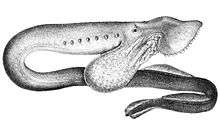Pouched lamprey
| Pouched lamprey | |
|---|---|
 | |
| Drawing by W. Wing | |
| Scientific classification | |
| Kingdom: | Animalia |
| Phylum: | Chordata |
| Class: | Cephalaspidomorphi |
| Order: | Petromyzontiformes |
| Family: | Geotriidae D. S. Jordan, 1923 |
| Genus: | Geotria J. E. Gray, 1851 |
| Species: | G. australis |
| Binomial name | |
| Geotria australis J. E. Gray, 1851 | |
| Synonyms[1][2] | |
|
Genus synonymy
Species synonymy
| |
The pouched lamprey (Geotria australis) also known as wide-mouthed lamprey, is the only species in genus Geotria, which is in turn the only genus in the family Geotriidae. It is native to the southern hemisphere. It spends the early part of its life in fresh water, migrating to the sea as adult, and returning to fresh water to spawn and die.
Description
%2C_Northland.jpg)
G. australis, like other lampreys, has a thin eel-like body, and grows up to 60 cm (24 in) long.[3] It has two low dorsal fins on the back half. Like other lampreys, it has no jaws, only a sucker. The skin is a striking silver in adult lampreys caught fresh from the sea but soon changes to brown after they have been in fresh water for some time, due to deposition of biliverdin. Adult eyes are relatively small and located on the side of the head. When fully mature, males develop a baggy pouch under their eyes, the function of which is unknown. However, there have been suggestions that the pouch in northern hemisphere species has been used by males during breeding times for gathering stones to make a nest.[4]
Life cycle
The freshwater ammocoete or larval stage of the life cycle are a dull brown in colour for most of their lives. Ammocoetes remain in fresh water for about four years until undergoing a six-month metamorphosis,[5] changing to silver with blue-green stripes. The central nervous system of the pouched lamprey develops notably during metamorphosis to the large-eyed macropthalmia stage, with particularly large increases in the volume of visual areas of the brain.[6] At this point they migrate downstream to the sea.
Adults spend some of their life in the open sea, living as a parasite on other fish. They attach themselves to the gills or side of the fish and rasp at the tissues below. Adults return to fresh water to breed, spending up to eighteen months sexually maturing before spawning. Adults have been recorded living up to 105 days after spawning and wrapping themselves around egg masses to provide parental care.[7]
Distribution and habitat
The pouched lamprey is widespread in the Southern Hemisphere, occurring in New Zealand, Chile, Argentina, and the southwest and southeast corners of Australia.
References
- ↑ Froese, R.; Pauly, D. (2017). "Geotriidae". FishBase version (02/2017). Retrieved 18 May 2017.
- ↑ "Geotriidae" (PDF). Deeplyfish- fishes of the world. Retrieved 18 May 2017.
- ↑ Dianne J. Bray & Martin F. Gomon. (2011), Pouched Lamprey Geotria australis, in Fishes of Australia, accessed 07 Oct 2014, http://www.fishesofaustralia.net.au/home/species/3415
- ↑ Monette, S. N.; Renaud, C. B. (2005). "The gular pouch in northern hemisphere parasitic lampreys (Petromyzontidae)". Canadian Journal of Zoology. 83: 527–535.
- ↑ "Geotria australis: Pouched lamprey". Fishbase. Retrieved 2013-12-15.
- ↑ Salas; et al. (2015). "Ontogenetic shifts in brain scaling reflect behavioral changes in the life cycle of the pouched lamprey Geotria australis". Frontiers in Neuroscience. 9. doi:10.3389/fnins.2015.00251.
- ↑ Baker, Cindy; Jellyman, Don; Reeve, Kathryn; Crow, Shannan; Stewart, Michael; Buchinger, Tyler John; Li, Weiming (2017). "First observations of spawning nests in the pouched lamprey Geotria australis". Canadian Journal of Fisheries and Aquatic Sciences. ISSN 0706-652X. doi:10.1139/cjfas-2016-0292.
- Allen, Gerald R. (1989). Freshwater Fishes of Australia. T.F.H. Publications.
- Todd, P.R.; Wilson, R.D. (1983). "Epidermal pigmentation and liver coloration in the southern hemisphere lamprey, Geotria australis Gray". New Zealand Journal of Marine and Freshwater Research. 17: 21–26. doi:10.1080/00288330.1983.9515983.
External links
- "Geotria australis". Integrated Taxonomic Information System. Retrieved 16 April 2006.
- Froese, Rainer and Pauly, Daniel, eds. (2012). "Geotria australis" in FishBase. April 2012 version.
- New Zealand lamprey discussed on RadioNZ Critter of the Week, 12 February 2016